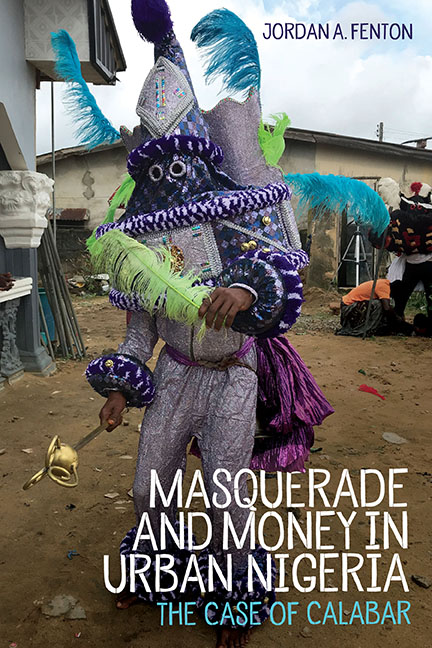Chapter Nine - “I Know Myself”: Masquerade as an Artistic Transformation
Published online by Cambridge University Press: 26 May 2022
Summary
On a November night in 2009, at about eleven o’clock, I was driving to an Ekpe night ritual featuring an important masquerade display in Calabar South. Accompanying me were three Efik Ekpe members with whom I have been working for some time. Among them was Chief Ekpenyong Bassey Nsa, the highly respected Efik Ekpe artist featured in chapter 5; My other two companions, who will remain anonymous due to local protocol, are sought after and awarded Ekpe masqueraders—accolades both still enjoy to this day.
As we navigated through the dark and desolate streets late that night, we informally chatted about Nigeria's World Cup chances, joked about something that happened the day before, and discussed what tonight's ritual would entail. I distinctly recall one of the two masqueraders quietly sitting, caught in a contemplative, detached state. I initially thought something was wrong since he normally enjoyed engaging in this type of friendly banter. I recall seeing him in my rearview mirror: the weight of his head rested on his hand, supported by the backseat's armrest. His intent gaze was blankly fixed on the console between the driver and passenger's seat. He was unmistakably caught in a state of deep thought and reflection.
Soon after we arrived at the ritual site, I learned he was the one to don the all-important Nyamkpe Ekpe masquerade and execute its related performance. Weeks later, during discussions with him, I learned his quiet solitude during our car ride marked a critical moment of his mental, physical, and artistic preparations for his Nyamkpe state of mind (refer to Figure 3.10). It is important to stress that the performance that night was indeed Nyamkpe, a mask defined as the most significant and sacred of all Ekpe masquerades. Scholars working in the Cross River region have noted this mask's importance. However, some have incorrectly likened Nyamkpe, as well as other Ekpe masquerades, to a type of “leopard spirit” (Talbot 1926, 785; Jones 1956, 140; Latham 1973, 37; Thompson 1974; Ekpo 1978, 73; Lieb and Romano 1984), perpetuating the idea that this society is shrouded in animism, or that Ekpe/Mgbe masqueraders transform into an animal spirit or ancestral entity; both of these ideas are very far from the truth.
- Type
- Chapter
- Information
- Masquerade and Money in Urban NigeriaThe Case of Calabar, pp. 311 - 347Publisher: Boydell & BrewerPrint publication year: 2022

